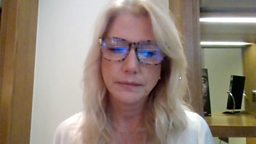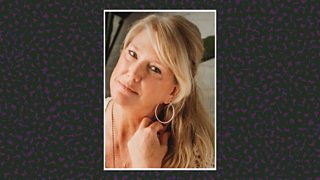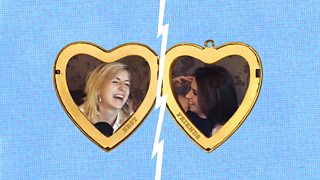‘There’s no way to process it’: How I found out my friend Charlie was a serial killer

Over 20 years ago, while working night shifts in a US hospital, critical care nurse Amy Loughren found out that her colleague and close friend Charlie was harming patients. He soon became one of America’s most notorious serial killers.
Charles Cullen was a nurse who administered lethal doses of medication to patients in multiple hospitals and nursing homes throughout his 16-year career. In 2006, Cullen pleaded guilty to 29 murders, but admitted he could have killed up to 40 people – he simply couldn’t remember the final figure. He is now serving a life sentence for his crimes.
As her story is told in Netflix's new film, The Good Nurse, starring Eddie Redmayne and Jessica Chastain, Amy joined Jessica Creighton on ´óÏó´«Ã½ Radio 4’s Woman’s Hour to share how she found out her friend Charlie was a serial killer, and the central role she played in bringing him to justice.
'We knew what the other one was thinking, that’s how close we were’
“We were very trauma bonded from being in the ICU where every single day is life or death”, recalls Amy about working with Charles on shifts in the hospital. “We had a bond that was very deep. We could look across the room and make one little gesture and we knew what the other one was thinking, that's how close we were.
My instincts really betrayed me. And I had a lot of guilt about that.
“I wish I could say that my instincts kicked in about him. But they didn't. My instincts really betrayed me. And I had a lot of guilt about that. He was good at pretending to be this caring and loving person. He had perfected it. It was an act and I fell for it.”
‘No one thought he was being fired because he was harming people’
In 2002, Charles was fired from his job at the hospital. Amy says she and her colleagues were angry and thought someone must have pinned something on him, as he seemed like a good nurse.
“The only thing that I knew was that he had been escorted off the premises by security. I was so angry. I was so upset. It just sent a wave of fear through all of my colleagues because if he could be fired, and he was such a good nurse, we could all be fired.
“He was my partner. He was my work husband. He was my favourite team member. I was really upset. No one thought he was being fired because he was harming people.”

It was then that Amy says she knew he was a murderer
When an investigator got in touch and showed her some incriminating evidence, she realised she didn’t know him as well as she’d thought.
My heart was racing. I don't remember driving home that day.
“He really took a leap of faith and gave me the Pyxis printouts. The Pyxis is kind of like a cash register - you type in the medication and the patient's name, a drawer pops open, and you take the medication. So those printouts showed his activity within it.
“There were several very sinister withdrawals on his printout. There was no possible way that he could have taken out those medications for any other reason, except for harming someone.”
It turned out that Charles Cullen had been administering lethal doses of medication to patients in multiple hospitals and nursing homes throughout his 16-year career.
His employment history was full of accusations of mishandling medication, harassment of colleagues and suspicious patient deaths in his care, as well as multiple sackings.
‘Everything kind of went blank’
“I had a complete paradigm shift where everything kind of went blank”, says Amy about the moment she realised what her friend had been doing. “My world just came down to a pinpoint and I blanked out. I just couldn't believe it. My heart was racing. I don't remember driving home that day.
“Behind the scenes, they asked me to help them. They asked if I could continue my relationship with Charlie, continue the friendship that was already there, and if I could make that leap of being afraid of him, knowing what he had done, knowing that he was a monster, and still find a place within myself to help.”
‘People would never know I was working behind the scenes. They would place me with a serial killer’
It was a difficult decision for Amy to help bring Charles to justice. She wasn’t just concerned about how being involved in the investigation could impact her, but also how it could impact her family. It was her daughter, who was 11 years old at the time, who encouraged her to help the police.
“When the detectives asked me if I would wear a wire, I knew that Charlie was already in the newspapers. There was an opportunity for perhaps me to have my photograph taken with him. People would never be able to know that I was working behind the scenes. They would just place me with a serial killer.
“I didn't want that to affect my daughter, who would have her entire life pulled out from under her. We lived in a very small town, and you know how judgmental people can be. I said to my daughter: ‘We won't do this unless we can do this as a family. I'm not going to hurt you. I'll find a way to help without hurting us.’
“She said: ‘Mom, he's murdering people. Of course, we're going to do this.’ And she said: ‘I don't care if we have to move. I don't care what people think of you. We need to do this.’”

‘Our friendship is what really put him behind bars’
After Amy agreed to help the police, they recorded telephone conversations between Amy and Charles and found that he had been hired at yet another institution. They asked Amy to meet him in person, with a wire, to try to get a confession for the murders.
I wanted those victims and the families that were robbed of the opportunity to get better to have a voice.
“He showed up with these newspapers. By that time, the paparazzi had been following him around because it had gotten out that there was someone that could have been harming patients at our hospital. He proudly showed me these newspaper clippings of him, and that they had mentioned him by name. He was very proud. I confronted him and told him that I knew that he was harming people.”
While this gave the police enough information to hold him in custody, they didn’t have a confession. Amy made one final attempt to get him to confess.
“The detectives had already told him that there was a possibility that I was being implicated. When they had arrested him, he would not speak, and they were going to have to let him go.
“I realised that there was still that performative aspect of him. He still wanted to be my hero. In order to protect me, he ended up confessing, believing that I was going to have to take responsibility for the things he had done. So, our friendship is really what put him behind bars.”
'I really did struggle with my guilt’
After Charles’ confession, Amy struggled to come to terms with why she hadn’t realised what Charles was doing from the beginning. “It was very hard. I really did struggle with my guilt and it sent me on this beautiful, transformative, spiritual quest to find out why I didn't know that there was a monster right next to me, right in front of me and why I didn't see him.
“That led me to such a beautiful answer. And that is the fact that I can only see the light in people. I can see past people's darkness. To me, the most beautiful thing of all of this was that it was okay that I saw that small spark of light within him because that is eventually what put him behind bars.”
‘I want the victims and their families to have a voice’
“The way that Charlie did these murders, people believe that he was a mercy killer. He was not. All of those victims had no voice. We sterilise their murderers but I wanted them to have a spotlight - not Charles Cullen, not my friend, Charlie. I wanted those victims and the families that were robbed of the opportunity to get better, I wanted them to have a voice.”
Following Cullen’s arrest, the hospital Charles and Amy worked at say they advocated for legislative reforms to prevent this type of tragedy from ever occurring again. This led to the passing of legislation in 2005 which requires criminal background checks of healthcare professionals and also requires healthcare entities to notify where disciplinary action is taken or where there are concerns of incompetence or misconduct.
To listen to Amy’s story on ´óÏó´«Ã½ Radio 4’s Woman’s Hour, head to the episode from 10 October on ´óÏó´«Ã½ Sounds. Plus, you can join the conversation on and @bbcwomanshour.





